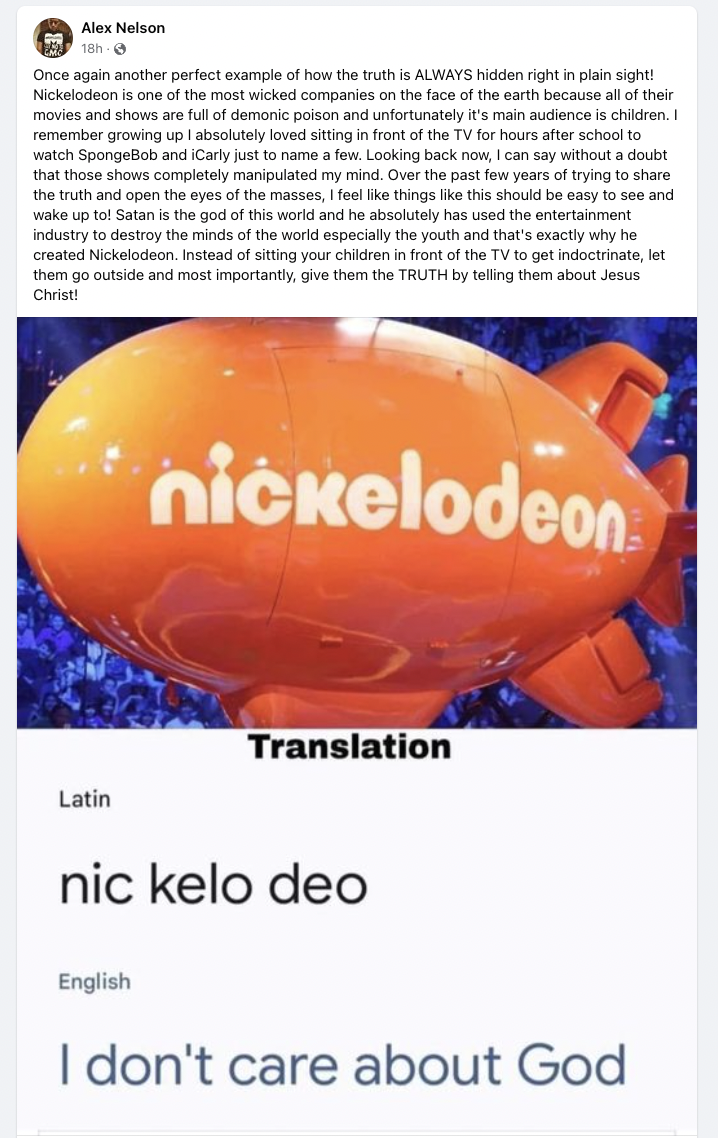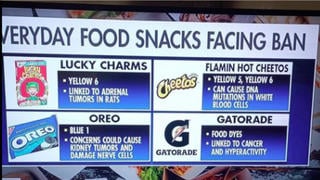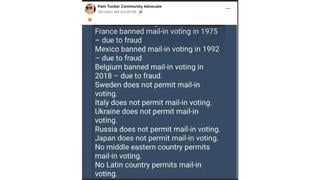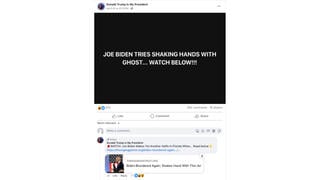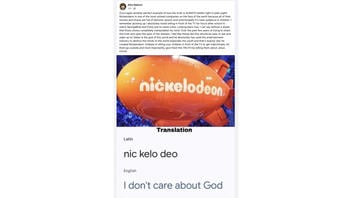
Does the TV channel's name "Nickelodeon" translate from Latin as "I don't care about God"? No, that's not true: The channel's name derives from the American name for a five-cent coin and the Greek word "odeon" used to refer to spaces dedicated to theatrical performances. The etymological meaning of "Nickelodeon" is "the poor man's theater."
The claim appeared in a post (archived here) on Facebook on March 20, 2024. It opened:
Once again another perfect example of how the truth is ALWAYS hidden right in plain sight! Nickelodeon is one of the most wicked companies on the face of the earth because all of their movies and shows are full of demonic poison and unfortunately it's main audience is children.
The attached image showed the channel's name on what looked like a model of an airborne blimp. That was followed by what seemed to be a Google Translate screenshot saying:
Translation
Latin
nic kelo deo
English
I don't care about God
This is what the post looked like on Facebook at the time of writing:
(Source: Facebook screenshot taken on Thu Mar 21 15:00:50 2024 UTC)
The post, however, was based on a ruse: It broke down the channel's name into random parts separated by spaces, changing its spelling to prompt Google Translate to "see" it as a phrase, not one word.
That's not how etymology works.
Etymology (archived here) studies a word's origin and the evolution of its semantics, paying close attention to how morphemes -- parts of the word it consists of -- change their meaning over time.
Morphemes are not random syllables or their combination -- they include a specific root and other elements, such as prefixes and suffixes, modifying the root's meaning or converting a word to a different part of speech.
If one intentionally changes the spelling of a linguistic item, that alters its meaning.
This particular post operated on a fallacy that ignored a well-known linguistic phenomenon: homophones (archived here). Those are words that sound the same -- and may even be identically spelled -- but mean different things.
According to Merriam-Webster, "nic" (archived here) is used in English as an abbreviation ("NIC") that stands for either "network interface card" or "newly industrialized country," "Kelo" (archived here) is a person's last name and "deo"(archived here) is only used as a separate word in Latin idioms referring to god (which is fundamentally different from such cases as "deodorant" where the combination of this three letters occurs from the prefix "de" meaning "off" or "from" and the first letter of the root "odor").
When the same combinations of letters are seen in different languages, it does not automatically mean that the words are related -- that has to be backed by additional evidence relying on a historical context and the practice of the word's use.
Contrary to the claim, "nickelodeon" (archived here) originated from a different combination of morphemes: nickel and the Greek "odeon." The former reflects the price of a movie ticket everyone could afford in the early 1900s; the latter refers to a building for performances.
In the early 20th century, nickelodeons could be found in many places across the United States, including Pittsburgh (archived here) and New York City's Brooklyn (archived here).
The TV channel Nickelodeon was launched in the late 1970s (archived here). In today's world where five-cent theaters do not exist anymore, it is typically used as a reference to the brand's name.
Bogus translations are not an uncommon tool for promoting false narratives.
Lead Stories previously wrote that "NASA" in Hebrew doesn't mean "to deceive," that Volodymyr Zelenskyy's last name is not translated to English as "evil rules the world" and that "Baal Enci Aga" is not Latin for "Baal Is The King."

